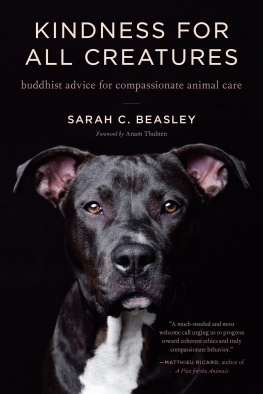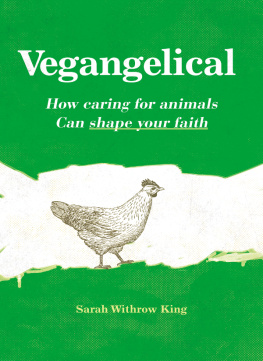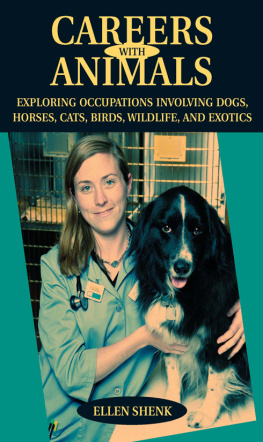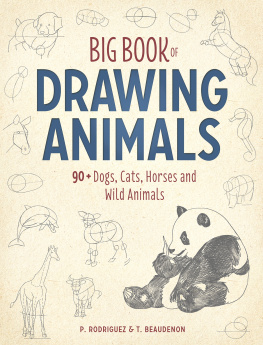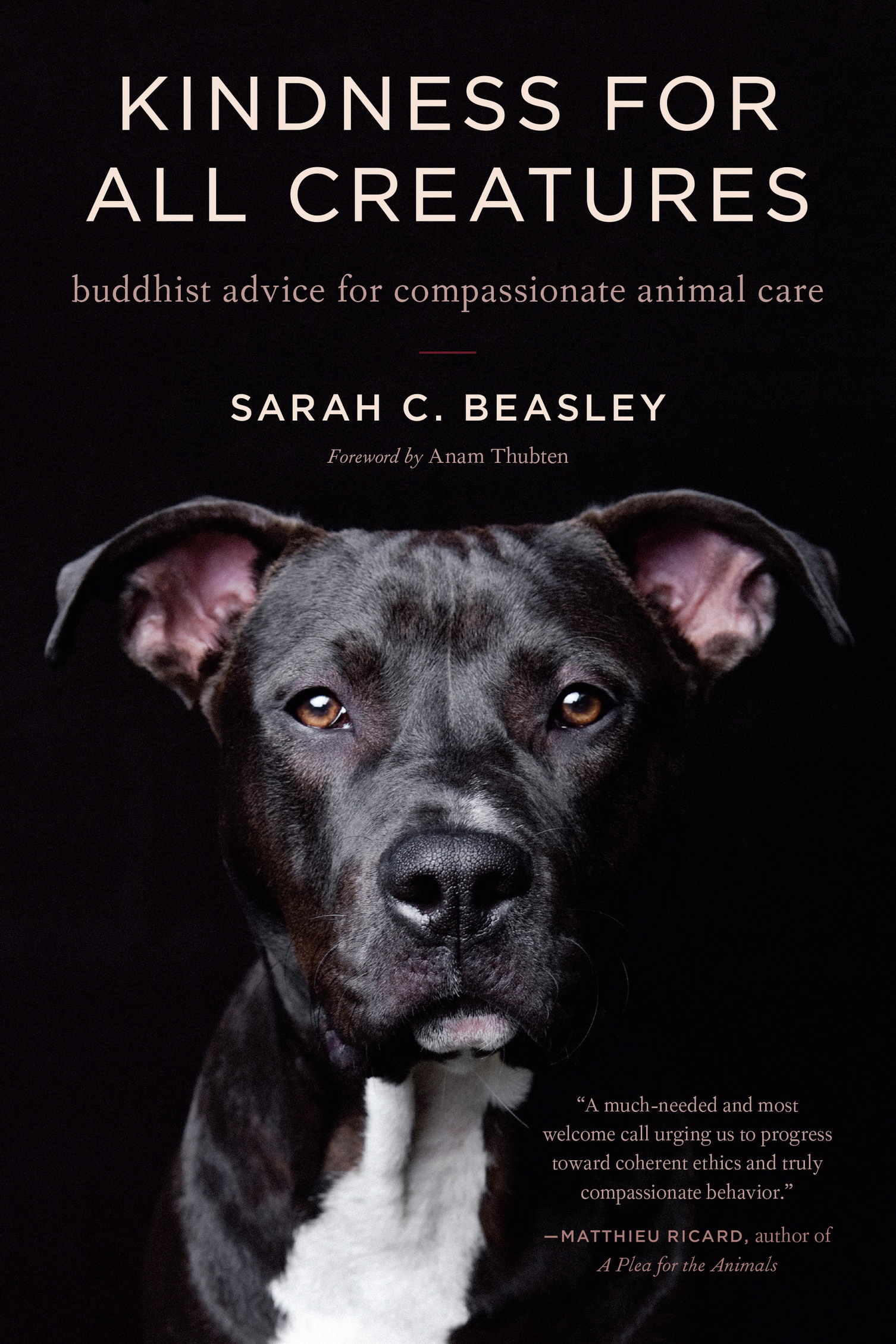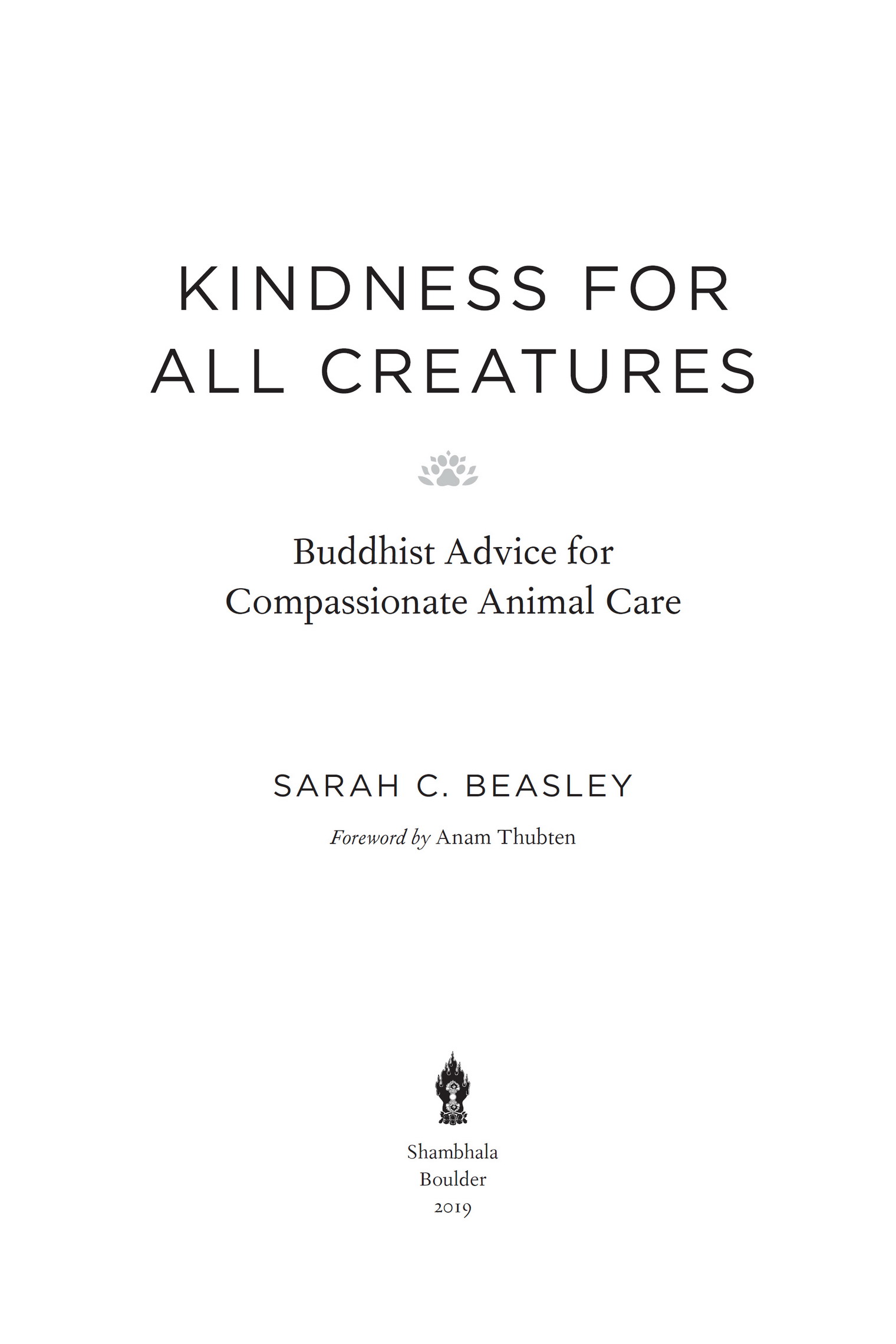Contents
Landmarks
Print Page List
Shambhala Publications, Inc.
4720 Walnut Street
Boulder, Colorado 80301
www.shambhala.com
2019 by Sarah C. Beasley
All rights reserved. No part of this book may be reproduced in any form or by any means, electronic or mechanical, including photocopying, recording, or by any information storage and retrieval system, without permission in writing from the publisher.
Ebook design adapted from printed book Designed by Kate E. White, with assistance from her beautiful creature, Maeby
Front cover photo by Michael Brian Photography
LIBRARY OF CONGRESS CATALOGING - IN - PUBLICATION DATA
Names: Beasley, Sarah C., author.
Title: Kindness for all creatures: Buddhist advice for compassionate animal care / Sarah C. Beasley; foreword by Anam Thubten.
Description: First edition. | Boulder: Shambhala, 2019. | Includes bibliographical references and index.
Identifiers: LCCN 2018052879 | ISBN 9781611806595 (pbk.: alk. paper)
eISBN9780834842274
Subjects: LCSH : AnimalsReligious aspectsBuddhism. | Animal welfareReligious aspectsBuddhism. | Pets.
Classification: LCC BQ 4570. A 53 B 43 2019 | DDC 294.3/5693dc23
LC record available at https://lccn.loc.gov/2018052879
v5.4
a
For the children,
especially, Arlo and Talyse, Zoe and Uma Mei, Emilia,
Clara and Tashi, Vivian, Samaya Jade, Eva Yasmin,
Athena, Delphine, Erowyn, Leah, and Evelyn
And for the young adults,
Eddie, Caty and Matthew, Aquila Sage,
Bella, Kevin, Maria, Larika, and Camryn
May your lives be filled with love and compassion,
and the joys of animal kinship.
CONTENTS
FOREWORD
Sometimes, maybe when taking a trip or strolling in nature, we are reminded that the world doesnt belong to just us humans; we share it with fellow creatures: deer, mountain lions, squirrels, frogs, and lizards, to name just a few. Not only does their existence make our world more beautiful, but they are integral parts of our amazing life-sustaining ecosystems and contribute to a complex web of interdependent life-forms. Humans and animals have coexisted on this planet for millennia, and we cannot harm one species without impacting another. Therefore, it is important not to neglect our responsibility to protect our animal friends, both domestic and wild. Lets learn to include all animals in our sense of family and community, and offer them all respect and love.
This is not a new idea. If we look around, many ancient traditions have been teaching it all along. Humans and animals can be wonderful friends to each other, and pets have been loved by people of many cultures throughout history. Pets give us unconditional love and companionship and teach us how to open our hearts. In the developed countries, people spend lots of money on their pets, buying special food, getting medical care from veterinarians, and taking them to the groomer. Various governments have passed laws that protect some animals from being tortured or killed senselessly. Yet so many animals are vulnerable and at the mercy of humans. There is still much need for compassionate and wise education about how to relate to animals and help animals who need our protection.
Buddhism teaches that we should not harm animals but rather love them. Animals are considered sacred in the nondual philosophy of Vajrayana Buddhism, which transcends arbitrary hierarchical divisions between beings created by the human mind. Such divisions can be misused as false rationale to use animals as we wish, making choices and taking actions uninformed by rightful conscience. It is true that animals and humans have areas of difference, physically, mentally, and emotionally, but there are many similarities too, and our differences do not give us moral permission to ignore their sacredness and stop loving them.
The concept of human rights acknowledges our desire to be happy, to not be the subject of mistreatment from others, and to be respected as an equal. The animal rights movement was born and has been growing all over the world from the simple understanding that animals are living beings who possess awareness that includes feeling both pain and comfort. Because animals dont speak human languages, its our task to attend to them and provide them conditions that give comfort. This is especially important in our relationship to domestic animals.
Intrinsically, we human beings are creatures with a strong moral impulse. Without learning how to love our fellow species, we will continue craving the fulfillment of this moral impulse. Motivated instead by our sole concern for the well-being of our own species, human beings have put our natural world in crisis. We have been missing the truth that all livings things are interdependent with each other. Therefore, it is time for us to wake up and realize that our hearts need to expand to include all living beings in this world, for our survival as well as theirs. Were reaching a point in history when there is a growing worldwide realization that our love must be extended toward other species; otherwise, our conscience will bite us from inside. Buddhism has so much to offer us about how to embody such all-encompassing love, and I appreciate that Sarah is applying this rich tradition to our relationship with animals.
While I was growing up in my hometown, there was an older Tibetan man who would sing a song that was titled something like Song from a Dog. This song was most likely written by a Tibetan lama. In the song, a dog sends a message to people letting them know that she is always hungry and being neglected. His song used to move the villagers and help them feel much-needed compassion toward animals. My friend Sarahs wonderful book is like that old mans song. There is no doubt that it will move the hearts of readers and help raise the level of awareness toward our animal friends. Sarah draws wisdom from many sources, and this book provides rich guidance on how to relate to animals in wise and compassionate ways. Im grateful for her wonderful work and wish that many will read this and increase their mindfulness and compassion toward all species.
ANAM THUBTEN
Richmond, California
ACKNOWLEDGMENTS
Deepest bow to my precious wisdom teachers, Lama Tsedrup Tharchin Rinpoche and Dungse Thinley Norbu Rinpoche, who lovingly ladled nectar from the deep well of pure dharma, instilling confidence, love, and commitment to the path. And to Reverend Taitetsu Unno, who offered the first taste of meditation, and modeled true reverence for animals.
Special thanks to Anam Thubten Rinpoche for giving refuge vows, for believing in this book, and for contributing its foreword, and to Lama Tsering Everest, Lama Dechen Yeshe Wangmo, and Lama Padma Drimed Norbu, for guiding me with unwavering strength and grace.
Heartfelt thanks to Professor Mark Unno at University of Oregon for sharing family stories, and Chris Soucy, Ed.M., Dr. Erika Bruner, DVM, Dr. Paula Backus, DVM, Heidi Nevin, Elaine Nash, Karlene Stange, and Gail Pope for interviews full of insights into animals lives.
Love and thanks to my dear parents, Jere Beasley and Nicki Haller, Lindy Beasley Pollak and Heinz Pollak; words cannot suffice.
Heartfelt thanks to George and Paula Saunders for kind writerly advice and genuine encouragement.

